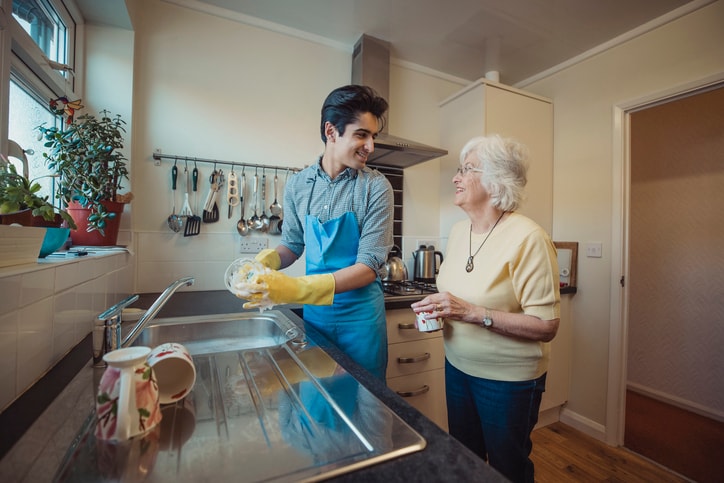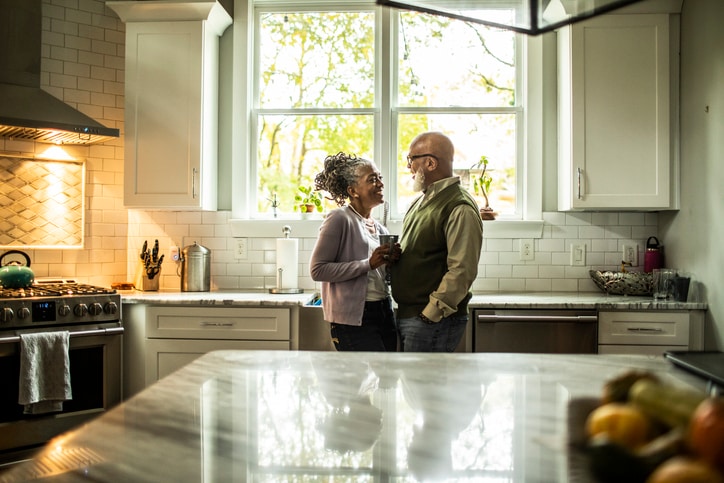There’s no doubt that there are lots of ways society — and even we ourselves, including caregivers at times — have misconceptions about older adults and what aging looks like. Now, a group of gerontology experts who work with seniors in different ways — from care management and nursing to running senior-centered nonprofits and businesses — is dedicated to setting the record straight.
Back in 2019, Shelly Abich, president of nonprofit Love of Gray, encouraged millennials who run senior-supporting businesses and projects to come together to form a group referred to as the “Gray Contributors” in order to offer each other support and collaboration. “When COVID hit, five of the Gray Contributors began communicating regularly as to how we could help seniors in a special way during this time,” says Abich. “We saw that despite the suffering, seniors were finally getting the spotlight we’ve always known they needed — particularly from the most disconnected groups, like millennials. It felt like our time to make moves and keep this positive societal shift going.”
To that end, the women have begun identifying themselves as #geroinfluencers, focused on positively influencing younger people on their views, treatment of and connection with seniors and what it means to age, says Abich.
Here, the Gero Influencers bust six of the most common misconceptions about seniors and aging.
1. Misconception: Older adults are closed-minded and out of touch
Truth: Janie Bailey, a certified geriatric care manager, who runs CoMo Senior Care and the brand Thriving Aging, says that these days, seniors seem to have a reputation for being closed-minded — something she finds completely false. “These are people who blazed the trails we walk through with ease. That isn’t history they read about, it was part of their life,” she says.
Bailey offers the example of an 88-year-old client who told her how, in the early 1970s, he pushed back against colleagues who didn’t want to hire an openly gay man. “He asked them to look at this highly qualified man, with impressive credentials, and make a vote based on his work ethic,” she says. Ultimately, the man was hired and received multiple promotions over the years. “Without trailblazers like this client who stepped up and stood strongly for change, we wouldn’t be where we are today,” says Bailey.
Similarly, Abich says many people think seniors are “out of touch.” But she refutes that notion with examples from her own life. Her 75-year-old mother-in-law opts to text instead of call and uses acronyms even Abich doesn’t know. “Our society assumes that the younger generations always know the most relevant things, but that is not always the case,” she says.
When talking to seniors, Bailey recommends asking them about their life experiences surrounding a topic versus simply their opinion on it. For instance, if you’re talking to an older adult about parenthood, ask, “What was your parenting experience like?” versus “Do you think I should be a parent yet?” Or “how did your parenting differ from your friends?” as opposed to “I’m having a problem with another parent in my friend group. What should I do?”
Bailey has found that a smart way to build a relationship with an older adult is to ask them about their experience and then take from it what you need, tapping into their wisdom. She believes that through storytelling, we can find even more commonalities between generations.
2. Misconception: They don’t understand what younger adults are going through
Truth: It’s easy to dismiss older adults as not “understanding” today’s problems, whether it’s the pervasiveness of social media or the difficulties of juggling work with caregiving. But Bailey says, “It would be impossible to find an older adult who hasn’t experienced hardships of some sort. It would be impossible to find an aging adult who [has] never had to question the status quo and where they stand. These people have so much life experience and the wisdom that comes with it. This is an almost completely untapped resource.”
In fact, Bailey has personally found that whenever she’s gone through a tough time, an older loved one has been there to remind her that not only will she get through it but will be better for it.
Carolyn Dalle-Molle, co-founder of The Silver Post, a monthly subscription service for mailing photos and updates to grandparents, adds that seniors aren’t that different from us. They have hopes, interests and ideas and have dealt with fear, uncertainty and more.
“The next time you’re grappling with a decision, celebrating an achievement or considering your options, connect with a senior you know,” suggests Dalle-Molle. “Ask for their thoughts or ideas on the matter. Open-ended questions are a beautiful portal for uncovering their wisdom. You’ll be amazed by the stories, insights and ideas we can gather just by acknowledging seniors are ‘like us, just plus.’”
3. Misconception: Being older means being boring
Truth: Katie Cheesman, a former home health nurse who now runs The Listening Ear Project, where she films and records senior stories and creates legacy videos for families, says she documented an 87-year-old named Grant who ran a 50-mile race. And she also talks about an 80-year-old named Carol who attended a Black Lives Matter march and Cleo and Donna, who had slumber parties into their 80s.
“Seniors are fun and lively and strong and so much more than they are painted out to be,” she explains. “I think that’s why I am so passionate about sharing my video interviews of seniors — to show society, especially younger generations, who they really are, because if you actually spend time with them, they break every stereotype in the book.”
4. Misconception: Phone calls are the only way to show you care
Truth: “The truth about connecting with seniors is that any gesture matters,” explains Dalle-Molle. “If phone calls aren’t a great option, and you can’t visit much, that’s OK. You’re not alone.”
Instead of throwing yourself into a guilt spiral, think about doing something else that shows you care: order flowers, send a gift or use a service like hers to send photos. “Curl up in that cozy blanket and set your own routine,” she says.
5. Misconception: They’re not into being active
Truth: The 87-year-old that Cheesman recorded running is just one of the many active seniors out there. Abich also points to her 77-year-old neighbor who rides a “flashy” recumbent bike up to 45 miles a day. “She is actually more active than I am at 39 and most everyone I know,” she says.
And Bailey has found that most older adults love dancing. “Almost all of my clients have goals to figure out ways they can keep dancing, whether it’s because their spouse has died or their legs don’t work as well; they want to find a way to keep dancing,” she explains. “I think this is a metaphor for life: find a way to keep dancing.”
6. Misconception: You don’t need to plan ahead
Truth: Bahamia Ulysse, LVN, CMC, a licensed vocational nurse and certified geriatric care manager who owns Give Care. Take Care., a boutique geriatric care management agency, says the number one thing people get wrong is what their parent’s aging process is supposed to look like.
She often finds that adult children expect or hope that their parents will “age gracefully” and don’t prep themselves for a different scenario. “They think their parent(s) only needs a ‘little bit of help’ or ‘just someone to peek in on them from time to time,’ and there’s often more to it than that,” she explains. “Not having a plan is particularly jarring to the adult child who must make crucial decisions for their parent(s) in an emotional state of mind. It is never easy and so unimaginably stressful.”
How to help? Have those crucial conversations about aging ahead of time. “Even if your parents are in excellent health today, now is the time to plan for what their aging journey will look/feel like for the both of you,” says Ulysse. That includes:
-
Getting legal documents (think: a will) in order.
-
Clarifying your parents’ or older loved ones’ wishes.
-
Researching the options that are available.
The best way to bust aging myths
Ultimately, uncovering the truth about aging requires talking more. “We combat the misconceptions and myths by having more dialogue — specifically intergenerational dialogue — about what aging looks like today and what we want it to look like in the future,” says Ulysse. “As we shift the narrative from a conversation that dismisses and overlooks our aging population to one that protects them and eases their way, we elicit positive change.”






